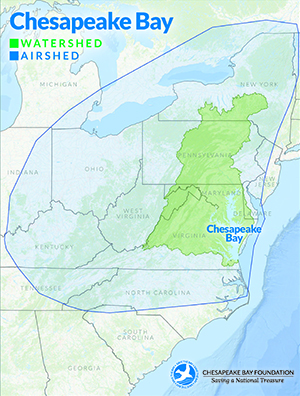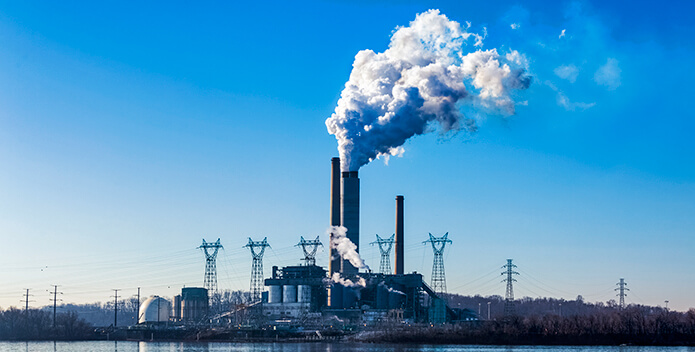At first glance, emissions from a coal-fired power plant in Kentucky, Indiana, or Tennessee would seem completely unrelated to the health of the Chesapeake Bay. But upon further inspection, the toxic clouds emanating from these facilities contains carbon dioxide, mercury, soot, sulfur dioxide, and nitrogen oxides. And while the Chesapeake Bay watershed covers 64,000 square miles, the Chesapeake Bay airshed is nearly nine times that size, covering 570,000 square miles.

Pollution fouling the Chesapeake Bay is coming from a lot farther away than most would think. In fact, nearly one-third of nitrogen polluting the Bay comes from the air.
This means that pollutants from those distant coal-fired plants end up in our lungs and our water. Last week, CBF and other environmental and public health partners sued the U.S. Environmental Protection Agency (EPA) for failing to act against out-of-state power plants whose emissions worsen Marylanders' health problems and have a negative impact on Maryland waters.
But it gets worse. This week, the EPA pulled out of the Clean Power Plan, allowing the proliferation of dirty energy to continue unabated under the pretense of the false narrative that environmental regulations hamper economic development and job growth. No individual state or organization can address an issue with the impact and reach of these toxic clouds billowing from the smokestacks of these coal-fired power plants. But the Chesapeake Clean Water Blueprint can provide a lesson.
After years of failed efforts by states to restore the Bay and its rivers and streams, the EPA exercised its Clean Water Act authorities by releasing enforceable pollution limits for nitrogen, phosphorus, and sediment pollution in the Chesapeake Bay. Subsequently, the six Bay states and the District of Columbia released their own plans to meet those limits by 2025.
And the Blueprint is working. Dead zones are shrinking, oysters are rebounding, and underwater grasses are making a comeback. Despite the recent bad news, the evidence is clear that when states and the federal government work together, cooperative federalism can greatly improve our economy, our environment, and our public health.
This Week in the Watershed: Trading Pollution, Acidifying Oysters, and Dirty Energy
- Often called "the most important fish in the sea," the future of the menhaden fishery along the Atlantic coast hangs in the balance. (Bay Journal)
- Maryland has drawn up rules that will allow farmers and others to buy and sell credits for environmental cleanup efforts. (Baltimore Sun—MD)
- The EPA and the Trump administration repealed the Clean Power Plan, which will harm the pollution reduction goals set in the Chesapeake Clean Water Blueprint. (Baltimore Sun—MD) BONUS: CBF Statement
- The growing acidification of the world's waters might threaten oyster recovery efforts in the Bay. (WJZ—MD)
- The inaugural Rod and Reef Slam was a smashing success, as anglers competed to catch the largest number of species on oyster sanctuary reefs. (Star Democrat—MD)
- The construction of the Atlantic Coast Pipeline would mean putting Virgina's waterways at risk. (Richmond Times-Dispatch—VA)
What's Happening Around the Watershed?
October 14
- Baltimore, MD: The Great Baltimore Oyster Festival returns to Baltimore's Inner Harbor! Benefiting CBF and the Waterfront Partnership's Healthy Harbor Initiative, the festival includes live music, oysters (raw, fried, and grilled), seafood dishes from local restaurants, beer, wine, and specialty cocktails, and family-friendly activities. The event is free to attend but you need to purchase a ticket to eat oysters. Buy tickets here!
October 15
- Solomons, MD: Returning oyster gardeners can pick up their spat for the fall/winter season. Click here to register!
October 18
- Hopewell, VA: Join us for a free landscape design workshop! We'll discuss how you can protect water quality, create habitat for native pollinators, and reduce erosion and flooding on your own property. Click here to register!
October 21
- Washington County, MD: Come help CBF plant more than 1,000 trees and shrubs. This planting is the final stage of restoring a floodplain in the Antietam Creek watershed. Click here to register!
- Annapolis, MD: Help grow the Bay's beloved bivalve–the mighty oyster! Join us for a new oyster gardener workshop to the supplies and training necessary to grow your own oysters. During the two-hour workshop, you will learn about oyster ecology, the importance of oysters to the Chesapeake Bay, and how to care for your oyster garden. You will also construct four oyster gardening cages that you will use to grow your oysters. Click here to register!
- Annapolis, MD: Returning oyster gardeners can pick up their spat for the fall/winter season. Click here to register!
October 22
- Shady Side, MD: Help grow the Bay's beloved bivalve–the mighty oyster! Join us for a new oyster gardener workshop to the supplies and training necessary to grow your own oysters. During the two-hour workshop, you will learn about oyster ecology, the importance of oysters to the Chesapeake Bay, and how to care for your oyster garden. You will also construct four oyster gardening cages that you will use to grow your oysters. Click here to register!
- Shady Side, MD: Returning oyster gardeners can pick up their spat for the fall/winter season. Click here to register!
October 28
- Frederick County, MD: Come help CBF plant more than 1,000 trees and shrubs along Israel Creek on a beef cattle farm in Frederick County. Approximately 5,000 feet of stream banks will be planted resulting is five acres of new riparian buffer. Israel Creek is in the Monocacy River watershed, which flows to the Potomac River then to the Chesapeake Bay. Click here to register!
October 30
- Fredericksburg, VA: Join us for a Clean Water Breakfast watershed updates from CBF and Friends of the Rappahannock's Kathy Harrigan. Learn the water quality challenges the next administration will need to tackle and our asks of the next Governor. Click here to register!
November 4
- Frederick County, MD: Come help CBF plant more than 800 trees on a beautiful, diversified farm that grows organic vegetables, 100-percent grass fed beef, pastured pork, and pastured poultry. After the planting, stick around to get a farm tour to see sustainable agriculture in practice and learn more about it firsthand. Click here to register!




